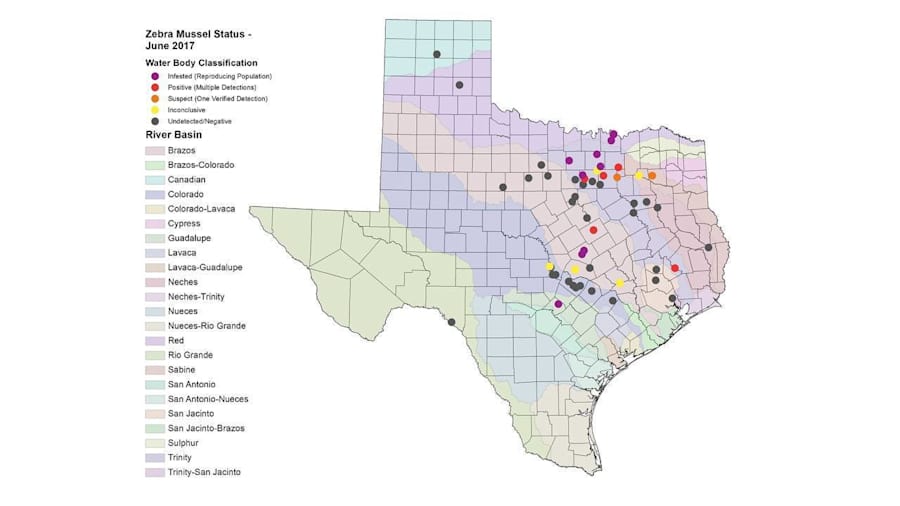AUSTIN, Texas – Canyon Lake is infested with invasive zebra mussels, Texas Parks and Wildlife Department officials said Monday.
The discovery, the first ever at the lake, was made Thursday by TPWD fisheries biologists and game wardens.
Employees at Canyon Lake Marina noticed the zebra mussels while working on a boat that had been stored in a slip at Crane's Mill Marina. They contacted TPWD to report the discovery and to get verification.
"This is the first positive documentation of zebra mussels in Canyon Lake and in the Guadalupe River Basin," TPWD Inland Fisheries regional director Brian Van Zee said. "Although marina staff have intercepted several incoming boats over the years that had invasive mussels attached, it is essential that boats stored on infested lakes be decontaminated before they're moved, as they are a key pathway for spreading this invasive species."
The rapidly reproducing zebra mussels, originally from Eurasia, can have serious economic, environmental and recreational impacts on Texas reservoirs and rivers, a news release said. Zebra mussels can cover shoreline rocks and litter beaches with treacherously sharp shells, clog public water intakes, and damage boats and motors left in infested waters.
The Guadalupe River and all of the reservoirs downstream of Canyon Lake are now at risk of invasion as zebra mussel larvae disperse downstream, Van Zee said. The reservoirs include Lake Dunlap, Lake McQueeney, Lake Placid, Meadow Lake, Lake Gonzales and Lake Wood, Van Zee said.

Canyon Lake's popularity as a boating destination combined with its deep water and suitable habitat made it vulnerable to the spread of zebra mussels, Van Zee said.
Possessing or transporting zebra mussels, dead or alive, is against the law in Texas. Boaters are required to drain all water from their boat and onboard receptacles before leaving or approaching a body of fresh water in order to prevent the transfer of zebra mussels that might be inside.
"Unfortunately, I think this is a textbook scenario of a zebra mussel infestation that is the result of a contaminated boat being launched in the lake," he said. "It really hits home how important it is for boaters to take ownership of the problem and to take the appropriate steps before moving a boat with zebra mussels attached as well as to clean, drain and dry their boats every time they leave a lake. We know that Texans love their lakes and rivers, and by taking these three simple steps they do a lot of good toward helping prevent further spread of invasive species in our state."
Zebra mussel larvae are microscopic, and both adults and larvae can survive for days in or on boats transported from a lake. The draining requirement applies to all types and sizes of boats, including personal watercraft, sailboats, kayaks/canoes or any other vessel used on public waters.
Since zebra mussels were first found in Texas in 2009, 10 lakes are now classified as infested, including Canyon.
Three state-listed threatened freshwater mussels, including the Texas Pimpleback, the Golden Orb and the Texas Fatmucket found in the Guadalupe River basin could be negatively impacted by the invasion, Van Zee said.
TPWD is working with the U.S. Army Corps of Engineers and the Guadalupe Blanco River Authority to continue to assess the extent of the infestation on Canyon Lake.


